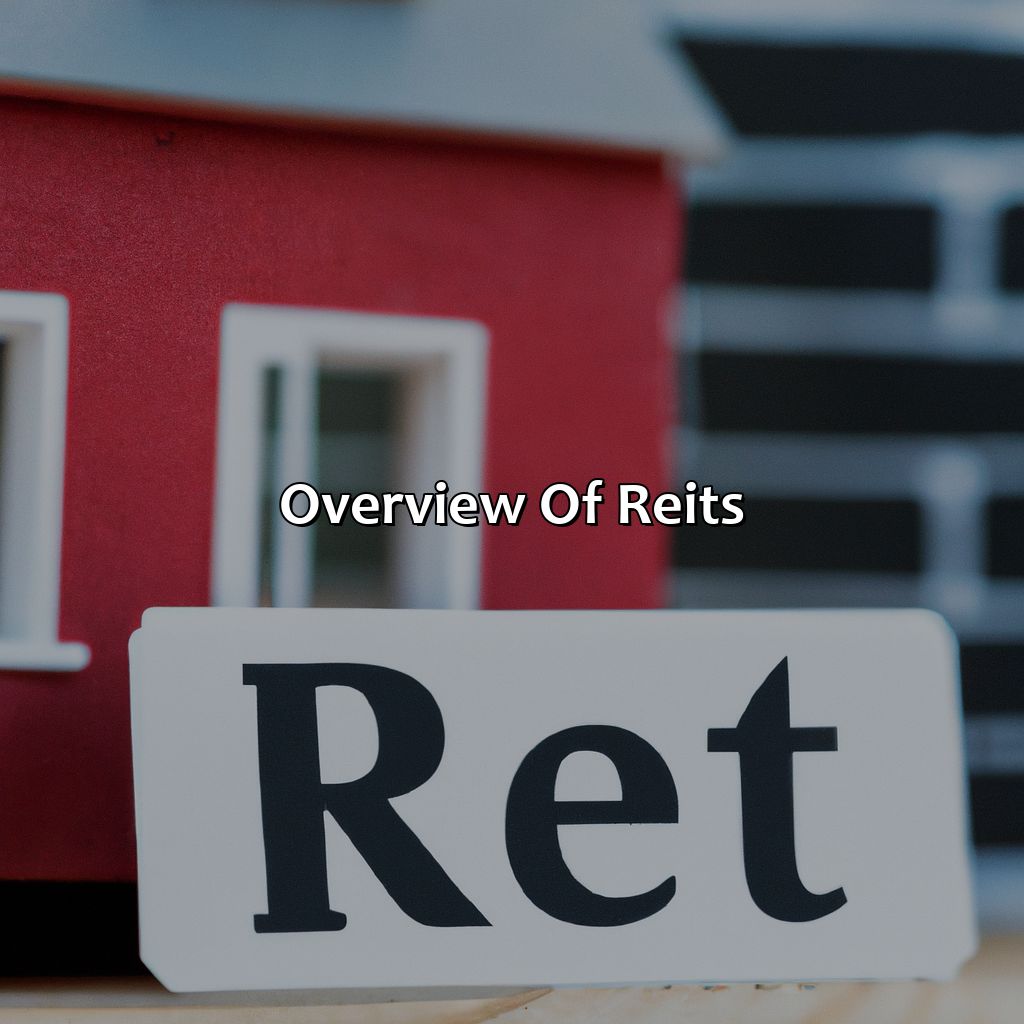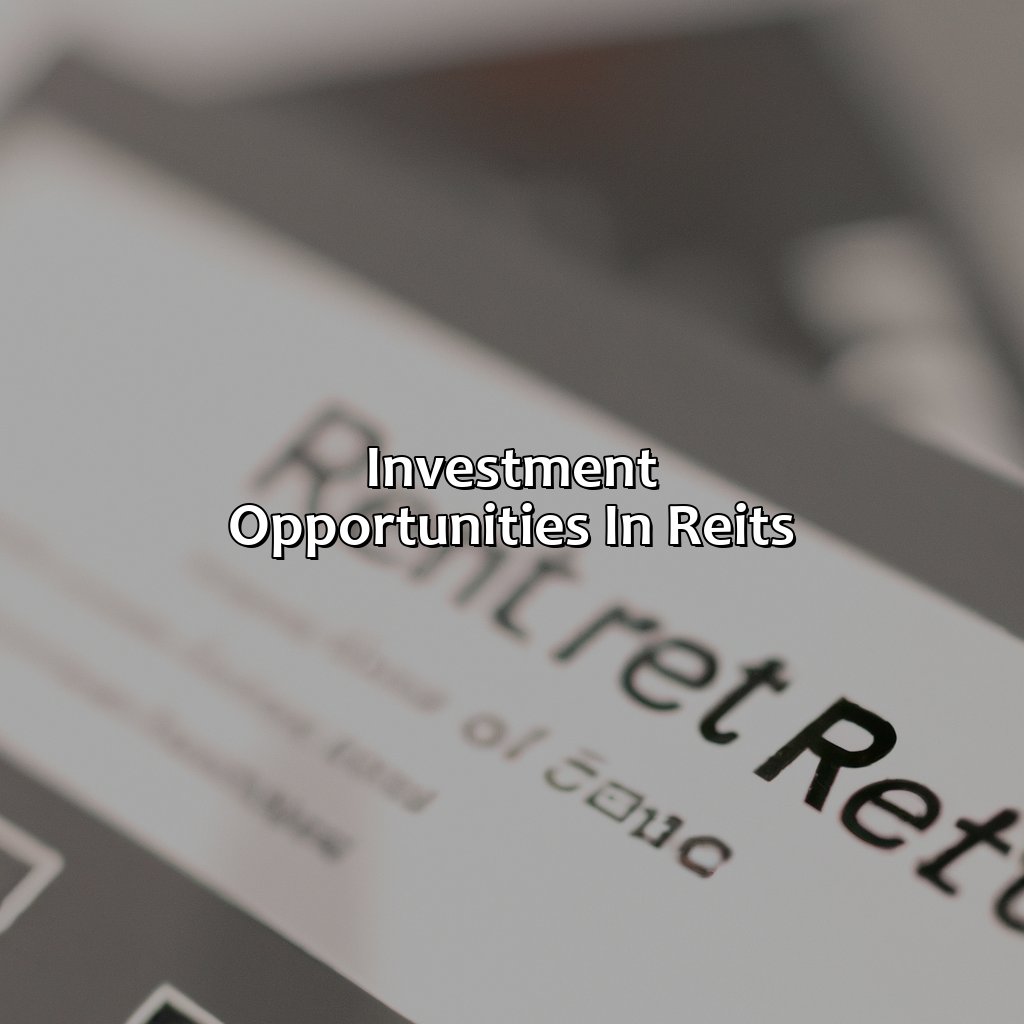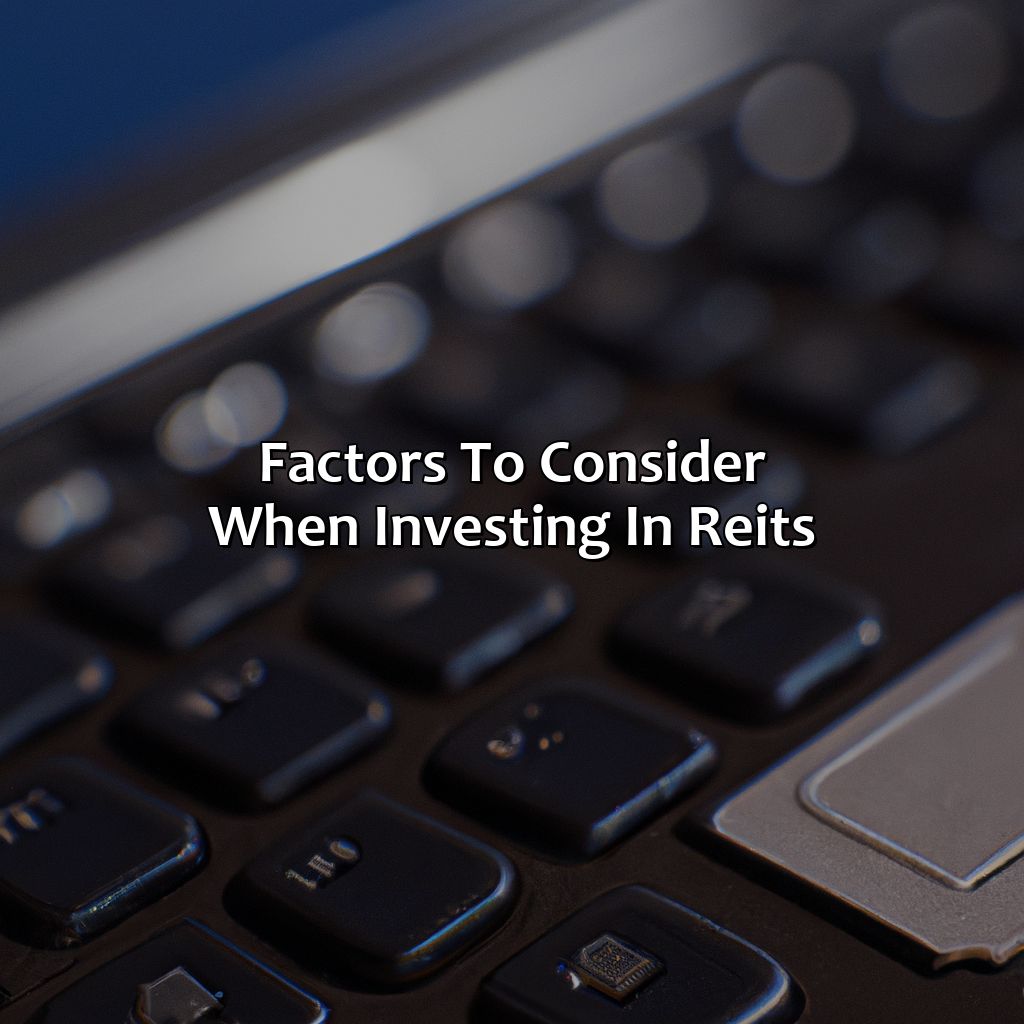What Is An Reit Investment?
Key Takeaway:
- REITs are a type of investment vehicle that allows individuals to invest in real estate without physically owning property. REITs are comprised of a portfolio of properties and securities, with income generated from rental income and property appreciation.
- There are two main types of REITs: equity REITs and mortgage REITs. Equity REITs invest in physical properties, while mortgage REITs invest in mortgages and other real estate debt.
- Investing in REITs has several potential benefits, such as diversification in real estate, potential for capital appreciation, and steady income. However, it is important to consider factors such as management team and property portfolio when selecting a REIT to invest in, and to be mindful of risks such as interest rate and property market risks.
Are you looking to diversify your investments and venture into real estate? An REIT investment may be the right move for you. This article details what REITs are and their potential benefits, helping you decide if it’s the right investment for you.
Overview of REITs
Real Estate Investment Trusts (REITs) are investments that allow individuals to invest in real estate without actually owning any property. These types of investments provide investors an opportunity to earn income from rental properties, commercial buildings, or other real estate assets. REITs have been around since the 1960s and are a publicly traded security that allows anyone with a brokerage account to invest in a diverse portfolio of real estate.
REITs come in two forms: equity and mortgage. Equity REITs own and manage properties, while mortgage REITs provide financing for properties. Investing in a REIT can provide regular income through dividends, as well as the potential for long-term capital appreciation.
One unique feature of REITs is that they are required by law to distribute at least 90% of their taxable income to shareholders. This means that investors in REITs can expect to receive regular income in the form of dividends.
Investors looking to invest in real estate but do not have the capital or expertise to own a physical property, REITs are a viable option. It is important to research and understand the different types of REITs available, as well as the risks involved before investing. Diversifying investments across multiple REITs and sectors can also help mitigate risk.

Image credits: retiregenz.com by Joel Woodhock
Types of REITs
To learn about REITs, read the “What is an REIT Investment?” article. It splits into two: Equity and Mortgage REITs. Each has unique advantages for investors to consider.

Image credits: retiregenz.com by Harry Arnold
Equity REITs
A popular type of REIT investment is one that deals with equity. Equity REITs invest in properties and earn revenue by leasing or renting space to tenants. They generate income through the collection of rent and capital appreciation. Equity REITs provide diversified exposure to different kinds of properties such as multifamily, retail, office, industrial, and healthcare facilities.
It is important to note that equity REITs focus primarily on income generation from real estate assets rather than capital transactions like flipping properties for profit. Moreover, investment in this type of REIT offers many benefits over traditional property ownership which include professional management, lower transaction costs, liquidity as well as diversification amongst multiple properties and tenants.
Investing in Equity REITs can be beneficial for investors seeking steady cash flows through regular dividend payouts while also gaining access to long-term appreciation potential. With various options available for investment including rental apartments, medical centres or shopping malls across regions both locally or internationally, individuals should consult experts’ advice before making any decision on investing in an equity REIT.
Don’t miss out on exploring the potential upside by investing in Equity REITs that may become drivers of consistent profits over time. Investors should understand the risks before putting their money into anything without careful evaluation first.
Why settle for a regular mortgage when you can invest in a mortgage REIT and get a piece of the pie?
Mortgage REITs
Investing in REITs can be a great way to diversify your portfolio, and Mortgage REITs offer a unique opportunity for investors. These types of REITs invest primarily in mortgages and other real estate debt instead of owning physical property. They earn profits by charging higher interest rates on the loans they provide than what they pay for their own financing.
Mortgage REITs have a higher risk profile since they are sensitive to changes in interest rates and may be affected by borrowers defaulting on their loans. That said, these risks can also bring greater rewards, as Mortgage REITs generally offer higher yields than other types of REITs. In addition, some mortgage REITs specialize in certain types of mortgages, such as residential or commercial properties.
While Mortgage REITs may not be suitable for every investor due to their risk profiles, they can be an attractive option for those seeking higher returns from their assets. It’s important to do your research before investing and assess whether the rewards outweigh the risks given your investment goals and risk tolerance.
Get ready to REIT and reap the rewards with these investment opportunities.
Investment Opportunities in REITs
Investing in REITs? Let’s focus on the benefits! Firstly, diversifying real estate is great. Secondly, there’s potential for capital appreciation. Thirdly, it offers steady income. Get all the solutions you need by checking out these sub-sections:

Image credits: retiregenz.com by James Woodhock
Diversification in Real Estate
Real estate diversification involves investing in multiple categories of real estate such as residential, commercial, healthcare, and industrial properties. This investment strategy enables investors to spread their risk across different kinds of assets and avoid relying on a single property type.
Investors can achieve diversification by investing in real estate investment trusts (REITs), which are companies that own or finance income-generating properties. REITs provide access to diverse portfolios of real estate assets without requiring large amounts of capital to purchase individual properties. Additionally, they offer the potential for higher returns and greater liquidity than direct real estate investments.
By investing in REITs, investors can also benefit from different geographic regions where these properties are located. REITs invest in various markets, which means an investor’s portfolio is diversified across different regions and shares the same benefits and risks.
Overall, the diversification of a portfolio through investing in REITs provides a range of financial benefits while minimizing exposure to risks associated with single property investments.
It’s worth mentioning that being able to invest in highly profitable markets is always rewarding for the investors. For instance, in 2019 Singapore-listed Mapletree Industrial Trust acquired 14 data centers located across North America and Europe for around $1.4 billion US dollars – what proved a profitable decision for reaping high returns at shareholders’ end!
If you’re looking for potential for capital appreciation, invest in REITs and watch your wallet get thicker than a milkshake from a fast food joint.
Potential for Capital Appreciation
Investing in REITs presents a promising potential for appreciation of capital. Due to market demand, the value of real estate properties held by REITs could surge, leading to significant returns for investors. This is particularly true for well-managed REITs that have a track record of profitability and growth.
Furthermore, the potential for capital appreciation can be maximized by choosing sectors that are predicted to perform well in the future. For example, healthcare and data center REITs have experienced growth due to an increasing need for these types of facilities. These REITs offer an opportunity for increased gains as they continue to expand their portfolios.
Moreover, investing in REITs not only presents potential financial benefits but also allows investors to diversify their investment portfolio easily. REITs allow individuals with limited resources or knowledge on investing in individual properties to invest in multiple properties through a single platform.
Considering all these factors, it is essential not to miss out on the opportunities presented by investing in REITs. FOMO (Fear Of Missing Out) should be avoided by investing in well-managed and diverse portfolios that align with your investment objectives and risk tolerance. Ultimately, strategic investments made today will reap financial rewards in the future.
Don’t let the stock market scare you, REITs offer the potential for steady income without the rollercoaster ride.
Potential for Steady Income
Investing in REITs offers potential for a steady source of passive income. As a real estate investment, REITs generate income through rent and asset appreciation, which is then distributed among shareholders in the form of dividends.
Moreover, REITs also provide diversification to an investment portfolio while providing exposure to various real estate sectors such as commercial, residential, or industrial properties. Additionally, due to their structure as publicly traded companies, they offer liquidity and ease of access for investors.
Investing in REITs requires careful consideration of factors such as the quality of the underlying assets and management team. However, with these considerations in mind, investors can benefit from a stable stream of income which is not subject to market volatility.
Don’t miss out on potential opportunities for steady income by neglecting this investment avenue. Consider adding REITs to your portfolio under the guidance of a financial advisor.
Before investing in REITs, remember: always read the fine print, because sometimes when they say ‘high yield,’ they actually mean ‘high risk.’
Factors to Consider When Investing in REITs
To invest soundly in REITs, you must think through multiple factors. To help, we offer a section on Factors to Consider When Investing in REITs. It has two subsections:
- Management Team
- Property Portfolio

Image credits: retiregenz.com by Yuval Washington
Management Team
The leadership and guiding force behind the REIT operation is a crucial factor to consider. The Board of Directors and executive management team oversee the investment strategy, property selection, financing decisions and other significant activities. Their qualifications, track record, alignment with shareholder interests and overall governance practices must be evaluated before investing.
Investors should assess the experience and tenure of senior management, their compensation packages, ownership stake in the company and alignment with shareholders’ interests. Evaluating board independence, diversity, expertise mix and decision-making processes is also important. Strong leadership with a focus on achieving long-term financial goals while maintaining high ethical standards reduces investment risks.
It is essential to evaluate potential conflicts of interest between management teams and external parties such as brokers or vendors that impair performance. Additionally, evaluating succession planning for key management positions adds an extra layer of protection.
Don’t miss out on maximizing your returns by not carefully evaluating the REIT’s Management Team. Perform thorough due diligence before investing in any REITs. If you do so considering all factors at play, you can brighten future opportunities for fair investment returns.
Why settle for owning just one property when you can have a diverse portfolio of REIT investments? #REITs #property #investing
Property Portfolio
Investment Properties are one of the main assets owned by a Real Estate Investment Trust (REIT). The Property Portfolio, as it is commonly known, includes all the properties acquired and managed by the REIT in order to generate rental income and/or capital appreciation. The portfolio may be composed of different types of properties such as commercial, industrial or residential, with each property having different characteristics and requirements.
It is important to evaluate the quality and diversity of a REIT’s Property Portfolio before investing. Diversification helps reduce risk by spreading investments across various property types and locations. A well-managed portfolio ensures that properties are being maintained properly so they have high occupancy rates, stable cash flows, and overall long-term profitability.
One key aspect to consider when analyzing a Property Portfolio is its geographic location. Regional economic trends can greatly affect a property’s value and demand for certain types of real estate assets like retail centers or warehouses. Additionally, demographic shifts and changing market conditions can impact a Property Portfolio’s performance over time.
According to a report by National Association of Real Estate Investment Trusts (NAREIT), in 2019, US listed Equity REITs had $2 trillion invested in nearly 157 thousand properties both domestically and internationally.
Investing in REITs is like playing Russian roulette, except instead of a gun, you’re holding a portfolio full of properties.
Risks Involved in REIT Investments
It’s essential to recognize that REITs are prone to variations in the economy and the real estate market. So, to comprehend the potential hazards of investing in REITs, let’s discuss the two sub-sections:
- Interest rate risks
- Property market risks
In this section, you’ll find out how these relate to the risks involved in REIT investments.

Image credits: retiregenz.com by James Arnold
Interest Rate Risks
Amid the dynamic nature of real estate investment trusts (REITs), there exist certain risks investors should take cognizance of. One such risk is the rate of interest change risk, which arises due to fluctuations in interest rates in the market. A variation in long-term treasury bond yields could impact REIT prices accordingly.
Given that most REITs borrow money to finance the acquisition and maintenance of their asset portfolio, changes in interest rates could have a significant impact on their performances. With an increase in interest rates, borrowing costs for REITs increases as well, leading to a decline in profitability, while decrease does the opposite.
It’s advisable thus that investors mitigate interest rate change risks by reviewing how their REIT entities’ portfolios are structured against rising/falling interest rate times. They can seek out specialists’ advice or check if their investments have historically experienced such volatility.
Despite an attractive reward opportunity from investing in REITs over alternatives such as stocks and bonds, it’s crucial to acknowledge its inherent hazards. For instance, data shows that many equity REIT markets underperformed during rising bond yield periods between 1995-2002; caution remains advised.
An investor who lost financially invested funds through poorly timed purchases amid market volatility tested our counsel and acknowledged being wiser with future investment choices – highlighting the need to factor external economic factors into investment decision-making.
Better start praying to the property gods, because investing in REITs comes with its fair share of market risks.
Property Market Risks
Investing in REITs involves certain risks that investors must be aware of. One of the major risks is the volatility of property market prices. Fluctuations in the rental and resale values of real estate can impact the performance of REIT investments negatively.
The property market is highly influenced by various factors like economic conditions, interest rates, and geopolitical trends. Inflation, recession or political instability can give rise to uncertainty in the market which can decrease demand for properties and hence reduce rental rates and market value.
Moreover, there are often restrictions when disposing of real estate assets in a REIT portfolio which increases the risk as they’re illiquid assets. This may limit your ability to move swiftly on opportunities that present fair value. It’s critical to understand these risks before investing.
Risk management is essential for any investor interested in this sector, such as diversifying contracts across different markets and asset classes to reduce these issues.
Real-life examples like the 2019 Hong Kong protests shutting down malls leading to decreased retail revenue will help you grasp how critical it is to invest wisely. Continuous research is crucial when investing in REITS as changes in leases can affect profitability due to leasing laws per region.
Five Facts About REIT Investments:
- ✅ A REIT (Real Estate Investment Trust) is a company that owns and operates income-generating real estate properties, such as apartments, office buildings, and shopping centers. (Source: Investopedia)
- ✅ REITs typically offer higher dividends than other types of stocks and can serve as a source of passive income for investors. (Source: The Balance)
- ✅ REITs provide diversification within the real estate sector, as investors can choose to invest in different types of properties and geographic locations. (Source: Nareit)
- ✅ REITs are required by law to distribute at least 90% of their taxable income to shareholders annually, making them a tax-efficient investment option. (Source: Forbes)
- ✅ However, like any investment, REITs carry risks, such as changes in interest rates, economic conditions, and property values. (Source: The Motley Fool)
FAQs about What Is An Reit Investment?
What is an REIT Investment?
An REIT investment is a type of real estate investment that allows investors to invest in a portfolio of income-generating properties. REITs pay out a portion of their profits in the form of dividends to investors, making them a popular choice for those seeking steady income streams from their investments.
How Do I Invest in an REIT?
There are a few ways to invest in REITs. You can purchase shares of publicly traded REITs on major stock exchanges, invest in private REITs through a broker-dealer or investment advisor, or seek out non-traded REITs through a financial professional.
What Are the Benefits of Investing in an REIT?
Investing in an REIT provides several benefits, including access to a diversified portfolio of real estate properties, steady income streams through dividends, potential for long-term capital appreciation, and the ability to invest in real estate without having to purchase and manage properties on your own.
What Are the Risks of Investing in an REIT?
Like any investment, investing in an REIT comes with risks. The performance of the REIT may be subject to changes in the real estate market, interest rates, and economic conditions. Additionally, limitations on liquidity may make it difficult to sell your shares in a timely manner.
How Are REITs Taxed?
REITs are required by law to distribute at least 90% of their taxable income to shareholders in the form of dividends. As a result, the taxable income earned by the REIT is generally not subject to corporate income taxes. Shareholders, however, must pay taxes on the income they receive from the REIT.
Are REITs a Good Investment?
REITs can be a good investment option for those seeking exposure to real estate without having to purchase and manage properties on their own. However, as with any investment, it is important to conduct thorough research and consult with a financial professional to determine if an REIT is a suitable investment for your individual needs and goals.
